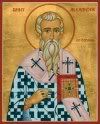...seem to reject the Apostle Paul's admonition to accept any personal deprivation and sacrifice in order to avoid scandalizing the faithful (1 Cor. 8:13). But what kind of scandal is St. Paul talking about? It is something that causes confusion in the realm of truth, and may thus deprive others of the possibility of participating in truth--the possibility of salvation. If by eating food offered to idols you give your brother's 'weak conscience' grounds for supposing that there is some connection between idol worship and the truth and life of the Church, then the responsibility for the confusion you cause is great indeed.
The challenge of the fools, however, does not create confusion in people's faith, nor does it obscure the Church. It simply surprises those who have identified faith and truth with the secularized concept of moral uprightness and conventional decorum. Fools for Christ have the gift, and the audacity, to manifest openly the human fall and sin which is common to us all: this is the reality of our nature, and it is not cancelled out by individual cases of 'improvement,' nor by concealment behind social externals.
In this sense, every monk in the Orthodox East is a kind of 'fool for Christ.' He wears a garment of mourning, openly declaring that he accepts our common fall and sin; and he withdraws into the ascetic life, waging war on this fall and this sin on behalf of us all. This same acceptance is the calling of every member of the Church. If we persist in ignoring the Gospel of salvation and continue to identify the regeneration of man with the social recognition of individual virtues, with worldly success in gaining individual moral respectability, then the fault is ours alone--and it is an error which bars us from truth and life.
The prototype to which the Church has always looked is not individual moral self-sufficiency, but the monks' lament of repentance. This lament is ultimately joyful--a 'joyful sorrow'--and turns sin into a measure of the acceptance of Christ's love. Man is able to mourn and lament only when he knows exactly what he has lost, and experiences this loss as a personal deprivation, a personal thirst. This is why repentance, the personal sense of the loss of God, is also a first revelation, our first acquaintance with His person, our first discovery of the extent of His love.
In the case of the fools for Christ, certainly their shocking freedom from every law, rule, restriction or code of obligations is not simply didactic in its purpose, reminding us of the danger of identifying virtue and holiness with conventional social decorum and egocentric moral rectitude. No one can ever really teach simply by calling into question mistaken concepts and ways of life: one has to make the fulness of the saving truth incarnate in oneself. The shocking freedom of the fools is first and foremost a total death, a complete mortification of every individual element in their lives. This death is the freedom which can break and destroy every conventional form; it is resurrection into a life of personal distinctiveness, the life of love which knows neither bounds nor barriers.
The example of the 'fools for Christ,' then, is neither extreme nor inexplicable, as it may perhaps seem to many people. It is the incarnation of the Gospel's fundamental message: that it is possible for someone to keep the whole of the Law without managing to free himself from his biological and psychological ego, from corruption and death. And that on the other hand, it is enough is someone humbly accepts his own sin and his fall, without differentiating it from the sin and fall of the rest of mankind, trusting in the love of Christ which transfigures this acceptance into personal nearness and communion, into a life of incorruption and immortality.
Christos Yannaras
Tuesday, January 30, 2007
The fools for Christ
Subscribe to:
Post Comments (Atom)


1 comment:
This is a very well-considered and insightful explanation. Thank you for posting it.
Post a Comment